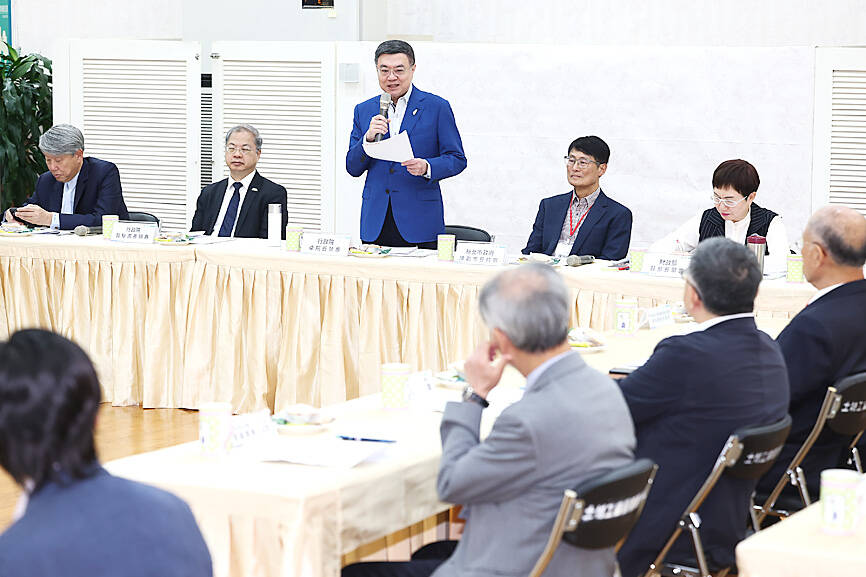The Executive Yuan yesterday announced further details of its NT$88 billion (US$2.71 billion) relief package for businesses affected by US tariffs, including application procedures and eligibility criteria, as the government aims to provide firms with greater financial flexibility amid global economic uncertainty.
The government has also eased requirements for relief applications to ensure more businesses remain operational amid US tariff threats, the Executive Yuan said in a statement.
The eligibility criteria for export loan guarantees and loans for small and medium-sized enterprises (SMEs) have also been relaxed, it said.

Photo: CNA
For example, companies that report a decline in revenue of at least 10 percent during a designated period this year compared with the same period last year, the second half of last year on a monthly basis or the January-to-February period, would qualify for government relief loans, it said.
The previous requirements limited eligibility to firms with a single-month revenue drop of at least 15 percent and fewer than 30 employees.
Exporters would benefit from reduced loan interest rates under the relief program, which is expected to assist up to 24,000 businesses, Executive Yuan Secretary-General Kung Ming-hsin (龔明鑫) said in a statement.
Loan terms for companies most affected by the new US tariffs would be extended, and the application process for new loans would be simplified, he said.
For agricultural financing, the program is projected to support up to 15,600 households, he added.
Meanwhile, the Ministry of Economic Affairs (MOEA) is allocating a total budget of NT$41 billion to support exporters and SMEs affected by US tariffs, the ministry said in a separate statement yesterday.
The funding would cover industrial transformation, research and development subsidies and assistance in securing overseas orders, the ministry said.
The ministry also plans to provide up to NT$6 billion in loan guarantees to support importers and exporters affected by US tariffs.
Each SME could receive up to NT$60 million in guarantees — with fees waived or reduced for up to two years — while large firms may qualify for up to NT$100 million, it said.
As part of the broader relief initiative, the Small and Medium Enterprise Credit Guarantee Fund (中小企業信用保證基金) plans to offer a new loan guarantee program offering loans of up to NT$35 million for SMEs once the current programs expire in October, fund chairman Wei Ming-ku (魏明谷) told the Taipei Times.
The fund has provided up to NT$800 billion in loan guarantees to local small, medium and micro-sized enterprises since May 2023, Wei said.

Taiwan will prioritize the development of silicon photonics by taking advantage of its strength in the semiconductor industry to build another shield to protect the local economy, National Development Council (NDC) Minister Paul Liu (劉鏡清) said yesterday. Speaking at a meeting of the legislature’s Economics Committee, Liu said Taiwan already has the artificial intelligence (AI) industry as a shield, after the semiconductor industry, to safeguard the country, and is looking at new unique fields to build more economic shields. While Taiwan will further strengthen its existing shields, over the longer term, the country is determined to focus on such potential segments as

UNCERTAINTY: Innolux activated a stringent supply chain management mechanism, as it did during the COVID-19 pandemic, to ensure optimal inventory levels for customers Flat-panel display makers AUO Corp (友達) and Innolux Corp (群創) yesterday said that about 12 to 20 percent of their display business is at risk of potential US tariffs and that they would relocate production or shipment destinations to mitigate the levies’ effects. US tariffs would have a direct impact of US$200 million on AUO’s revenue, company chairman Paul Peng (彭雙浪) told reporters on the sidelines of the Touch Taiwan trade show in Taipei yesterday. That would make up about 12 percent of the company’s overall revenue. To cope with the tariff uncertainty, AUO plans to allocate its production to manufacturing facilities in

COLLABORATION: Given Taiwan’s key position in global supply chains, the US firm is discussing strategies with local partners and clients to deal with global uncertainties Advanced Micro Devices Inc (AMD) yesterday said it is meeting with local ecosystem partners, including Taiwan Semiconductor Manufacturing Co (TSMC, 台積電), to discuss strategies, including long-term manufacturing, to navigate uncertainties such as US tariffs, as Taiwan occupies an important position in global supply chains. AMD chief executive officer Lisa Su (蘇姿丰) told reporters that Taiwan is an important part of the chip designer’s ecosystem and she is discussing with partners and customers in Taiwan to forge strong collaborations on different areas during this critical period. AMD has just become the first artificial-intelligence (AI) server chip customer of TSMC to utilize its advanced

Chizuko Kimura has become the first female sushi chef in the world to win a Michelin star, fulfilling a promise she made to her dying husband to continue his legacy. The 54-year-old Japanese chef regained the Michelin star her late husband, Shunei Kimura, won three years ago for their Sushi Shunei restaurant in Paris. For Shunei Kimura, the star was a dream come true. However, the joy was short-lived. He died from cancer just three months later in June 2022. He was 65. The following year, the restaurant in the heart of Montmartre lost its star rating. Chizuko Kimura insisted that the new star is still down